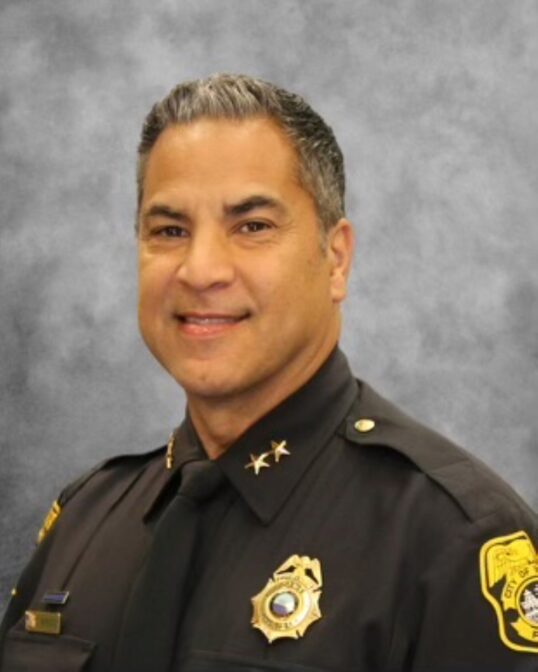
National Night Out in Reading, Aug. 1st, 2023.
Courtesy of Cody Rosselli

National Night Out in Reading, Aug. 1st, 2023.
Courtesy of Cody Rosselli

Courtesy of Cody Rosselli
National Night Out in Reading, Aug. 1st, 2023.
Reading’s Police department will have a new chief starting February 1.
With a 26-year-old career with the Tampa Police under his belt, Elias “Eli” Vázquez will have to tackle some of Reading biggest challenges, including youth gun violence and police understaffing.
The city’s hunt for a new chief began when Richard Tornielli resigned in July. Vázquez emerged as the top pick because of his extensive experience working in law enforcement in a city with a large Hispanic community.
Vázquez started as a patrol officer in Tampa in 1994 and rose through the ranks, working as a detective, sergeant and lieutenant. He has a total of 35 years in law enforcement.

City of Reading
Chief Elias “Eli” Vazquez, worked about 26 years for the Tampa Police.
“I can dare say that he walked the walk, and he did so in a very large agency. In almost all cases, Chief Vázquez spent several years of each rank before moving on to the next,” said Mayor Eddie Morán, who announced Vázquez’s appointment on January 9.
He said Vázquez was among a few select external and internal candidates, and emerged as the most qualified to lead Reading’s department. He will earn $145,000 annually.
Vázquez served on Tampa’s Hispanic Advisory Council and the Tampa Human Rights Board. He also served as the police department liaison to the Hispanic community.
Born to Puerto Rican parents in Brooklyn, Vázquez knows how to speak Spanish, though he said his is more like “Spanglish.”
About a year ago, Vázquez moved to New Jersey to be closer to family and took a job in corporate security. He said he has some familiarity with Pennsylvania, because he lived in the Lehigh Valley area for a while.
Vázquez said he is aware of some of the issues Reading faces, including gun violence and building trust with the city’s majority Latino community. As the Hispanic liaison in Tampa, he sometimes worked with migrant communities.
“A lot of times they don’t want to report because they’re scared to come and approach the police,” Vázquez said. “I did a lot of effort to try to engage communities, to get them to record when they’re victims of a crime and not to be afraid of police and develop relationships.”
Part of Vázquez’s overall approach in Reading will include reducing over-policing by employing a technique he refers to as “pinpoint policing,” which means using data and intelligence to target specific offenders who commit most of the crime, instead of sending out police officers without a clear goal or direction.
“You have to be very focused and very cognizant of the fact that how you police can affect those relationships and the tactics that you are using are affecting relationships,” Vázquez said.
Stephan Fains, Director of Community Engagement for Berks Community Action Program, said the biggest priority for a police officer should be knowing a community and its people, and taking time to get to know people through positive community gatherings, like basketball games and other recreational activities.
“Don’t just come when things are bad,” Fains said. “If you’re around when things are good […] those are the types of things that make you a community, not just a cop.”
For violent crime involving the city’s youth, which is a main concern among Reading residents, Vázquez said there has to be a “holistic approach” that includes collaboration with the city’s school district, parents, social services and community organizations.
“It’s a matter of just constantly communicating with all the different agencies that you have,” Vázquez said. He also supports the use of school resource officers and “would love” to increase their numbers in Reading schools, if possible.
However, not everyone agrees that having armed police officers in school is a good idea. Seleda Simmons, executive director and founder of The Real Deal610 – a nonprofit that runs mentoring programs for youth – said police presence could put young people who have already had bad interactions with the police and the justice system on the “defense mode.”
“I would really like and hope that they’re able to get to a point where there’s no armed policemen in there,” Simmons said.
Vázquez also wants to improve employee retention in the department, which has been dealing with understaffing issues. He plans to tackle low morale among officers by offering more opportunities for career growth and promotions and ensuring parity in pay and benefits.
The days of journalism’s one-way street of simply producing stories for the public have long been over. Now, it’s time to find better ways to interact with you and ensure we meet your high standards of what a credible media organization should be.